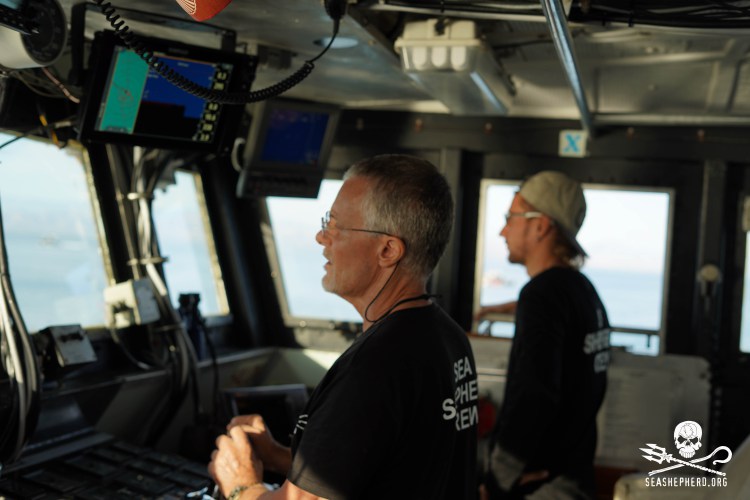Sea Shepherd Ship Joins Search and Recovery of Mexican Navy Helicopter
Published by Sea Shepherd Conservation Society
Mexican Navy helicopter crashes into the ocean while engaged in patrol protecting the highly endangered vaquita porpoise in the Sea of Cortez.
San Felipe, Mexico – October 22nd, 2018 – During the late afternoon of Saturday, October 20th, 2018, a Mexican Navy helicopter crashed into the ocean while engaged in anti-poaching patrols over the vaquita refuge in the Upper Gulf of California (a.k.a. Sea of Cortez). Sea Shepherd ship the M/V Farley Mowat participated in the search and rescue operation. Using the same techniques routinely used to find illegal fishing gear, the marine conservation group pinpointed the exact position of the helicopter wreck at the bottom of the sea using sonar, while assisting the Mexican Navy.
The MI-17 helicopter was in the middle of a patrol, ensuring the marine protected area in the Upper Gulf of California was free from illegal activities, when it apparently lost control and crashed into the sea. Fishermen in the area reported the incident to authorities using mobile phones and sped to the scene in pangas (small fishing skiffs) with the Mexican Navy soon on the scene.
Heroically, 11 of the 12 helicopter crew were rescued. Nine of them reported to be in good condition, with two seriously injured and one missing. The cause of the crash is under investigation by the Mexican Navy.

Sea Shepherd’s vessel M/V Farley Mowat was dockside in San Felipe Harbor at the time of the incident and hurried to join the search and rescue mission, after offering assistance to the Head of the Navy in the region. “By the time we arrived at the remote location it was already dark and the search and rescue team from the Navy and some fishermen were in the area looking for the missing flight crew and helicopter wreckage,” said Sea Shepherd Campaign Leader JP Geoffroy. “We used our sonar to visualize the wreck and determine an exact position, which was relayed to the Navy straight away. We used the same equipment used to detect sunken illegal fishing gear poachers use to catch the totoaba fish”
At 1:30 am on October 21, 2018, Navy divers were sent down to confirm the location pinpointed by the sonar. Due to strong currents, it was not possible for the divers to find anything. The search and rescue team had to wait for daylight the next morning to perform another attempt.
In the morning, the Navy divers confirmed the helicopter wreckage at 8.7 meters depth as recorded by the Sea Shepherd sonar the night before. One person is still missing.
“The search and rescue operation the M/V Farley Mowat was engaged in, along with the Mexican Navy, successfully located the downed helicopter in the early hours of the morning of the 22nd of October,” said the Captain of the M/V Farley Mowat, Robert Peel, adding, “The combined efforts of all personnel, of both the Sea Shepherd Conservation Society and the Mexican Navy, in addition to the use of Farley Mowat’s onboard sonar detection systems, allowed us to pinpoint precisely the position of the downed aircraft, to enable navy divers to locate and investigate the aircraft wreck, in very bad visibility condition and strong currents. Unfortunately, the missing person was not located in the aircraft.”

The Mexican Navy is present in the Upper Gulf of California and patrols the area protecting the vaquita porpoise – the most endangered marine mammal in the world.
The vaquita species is in dire straits due to poaching of another endangered species, the totoaba fish. Totoabas are fished exclusively for their swim bladders, which are sold in Asian black markets for upwards of $20,000 USD.
This is Sea Shepherd’s fifth season in the region, working by invitation of Mexican authorities. The marine conservation group returned to the area in September.
Currently carrying out Operation Milagro V, the conservation group removes illegal gillnets from the marine protected area known as the vaquita refuge in the Upper Gulf of California, as a proven method to keep the small porpoise from extinction.
The last released study showed that less than 30 vaquita were alive. Scientists have not published a new estimate in two years.
The Mexican government is engaging in an unprecedented effort to save the vaquita, dedicating resources from the navy, the army and several other federal institutions to keep the species from disappearing.
“Saving a species from extinction is no small task,” stated Sea Shepherd Founder Captain Paul Watson, who went on to say, “It is sad that one marine is still missing because of this tragic accident. Sea Shepherd commends these brave men that risk so much to protect and defend the endangered vaquita porpoise. Thankfully 11 of the 12 crew were rescued thanks to the prompt action by Mexican Navy officers and Mexican fishermen. Our sincere sympathies to the family of the missing man.”
Read the full article at: https://seashepherd.org/2018/10/22/sea-shepherd-ship-joins-search-and-recovery-of-downed-mexican-navy-helicopter/



